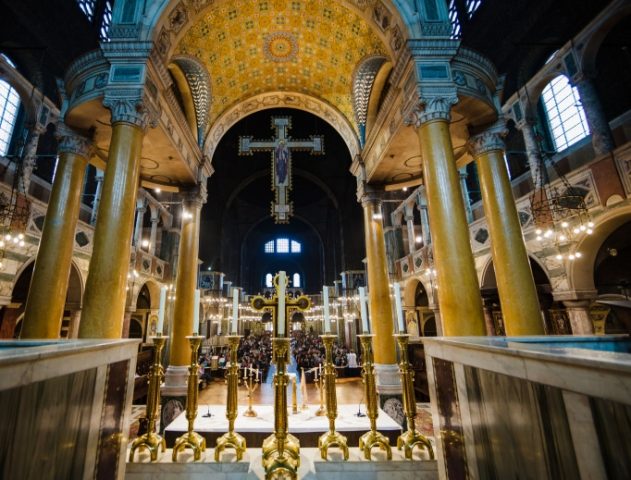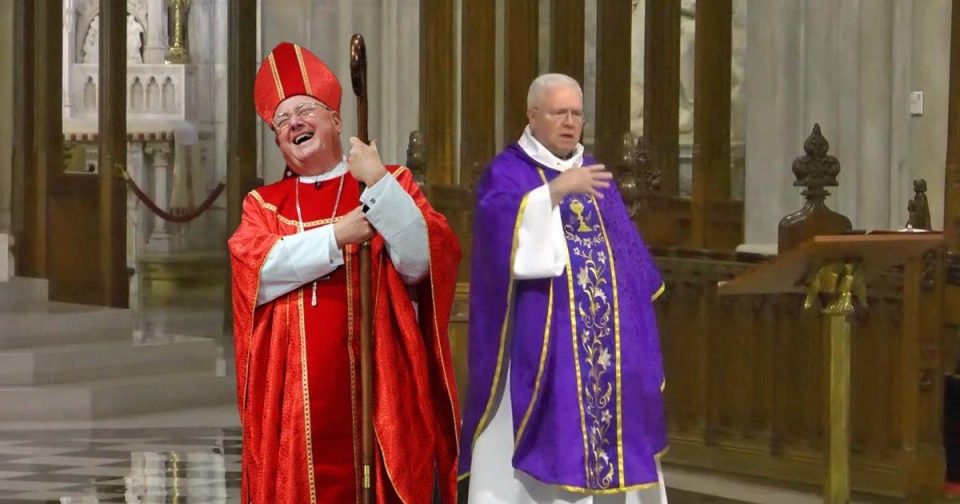London Prays: A Spiritual Response to the Abuse Crisis, by K.V. Turley

Democrat Strategist Creates ‘Fake’ Local News Sites in Key States to Sway Votes Away From Trump
November 30, 2019
10 Reasons to Reject Population Control and Celebrate Babies, by Patti Armstrong
November 30, 2019
In London’s Westminster Cathedral a packed congregation gathered in prayer for healing in the wake of the abuse crisis in the Church. Bishop John Keenan of Paisley, Scotland, was among the prayerful attendees.
A day of prayer, a healing ministry and a public act of atonement respond to deep wounds.
It is September 2019, and in London’s Westminster Cathedral a packed congregation is listening to a priest speaking of the abuse crisis in the Church.
Father Dominic Allain speaks clearly and calmly, but passionately, about those who have suffered at the hands of priests and others within the Church. He is an articulate preacher on the subject, with many years’ experience helping those wounded by such abuse. But he is someone who is also a fellow sufferer, having been abused in his teens.
His own history of abuse has made Father Allain a wounded healer. “I had had a history of abuse after my father died,” he told the Register Sept. 28. “I thought I had dealt with all this during [priestly] formation. I had had years of conventional counseling, spiritual direction, but then the arrest and trial of my abuser somehow brought the whole thing up again.”
While receiving counseling, he heard in passing of a program specially designed to heal the “spiritual wound” of abuse. “I was instantly convinced that this was what I needed, that the spiritual aspect of these wounds are what needs to be at the heart of any true healing and integration,” he recalled. “I traveled to the U.S. and experienced the healing power of a “Grief to Grace” retreat, which exceeded anything I could have imagined.”
From that point on, after benefiting from the healing ministry which Grief to Grace offers to survivors of abuse, Father Allain was convinced that he was called to help others in a similar way. “It was the last day of the Year for Priests, the feast of the Sacred Heart 2010. I knew I had received a divine call. I approached my bishop, and, by 2011, we had piloted the Grief to Grace retreat in England, and begun training a U.K. team.” Soon after, Father Allain began to run retreats in the U.K. and then internationally, and he has been doing so ever since.
Prayerful Response
The annual “Day of Prayer” at Westminster Cathedral started 19 years ago. During this time, the days have addressed diverse themes, including the abuse crisis in the Church. As one of the day’s organizers, Antonia Moffat, told the Register: “These annual Days of Prayer have involved serious themes concerning the needs of the Church, the persecuted Church and the world. The themes of repentance and reparation have always been at the forefront.” Moffat views these days of prayer, penance and reparation as part of a spiritual armory, fighting evil “with the weapon of God’s mercy. The purpose of the Days of Prayer is to bring, in prayer to the Lord, the serious issues of our times which are the cause of loss of faith, degeneration, disaster and war.”
And there are few more serious issues facing the Church today than the current abuse crisis. Present in the cathedral Sept. 28 were Father Allain and his Grief to Grace team. This ministry is much more than simply a “support group” with a Catholic dimension. Father Allain sees such days as “acknowledging the collective guilt and damage to Christ’s Body and asking for healing and mercy. We are recognizing that the crisis is ultimately grounded in rebellion against God’s holy law, and that all such rebellion has consequences for the whole Body [of Christ]. When one member sufferers, we all suffer, so that by our intercession and reparation, we are seeking to make up for the sins of the body and asking God to restore it to health. With such days we are demonstrating our acknowledgement of what one might call our solidarity in sin. … So we turn to him as suppliants, like the Publican in the parable, and say, ‘Have mercy on me, a sinner’; restore us individually and collectively.”
Also present on this 2019 Day of Prayer was Bishop John Keenan of Paisley, Scotland. He told the Register: “I see the purpose of these days as grounding our efforts at renewal of our Church on the spiritual foundations laid by the Lord in his original call, namely to ‘Repent, and believe the Good News.’”

Bishop Keenan is clear that in relation to the difficulties that assail the Church today, “we should not seek to solve our problems by ourselves, as if they were simply mistakes, when, in fact, the problem is more often than not one of sin that needs to be confessed to God, abandoning ourselves into his hands, so that his Divine Mercy can create for us something new.”
Bishop Keenan said that the presence of bishops at such events as the Day of Prayer is especially significant and much needed. By extension, he sees his attendance at the Day of Prayer as making present the whole College of Bishops from around the world — all are with him, he says, making atonement for the sins of those in positions of authority within the Church.
Communal Atonement
One of the most striking features of this Day of Prayer is the communal act of atonement made by all present. It occurs during the period when the Blessed Sacrament is exposed and adored on the cathedral’s high altar. A hush descends upon the packed congregation when the time of adoration commences; first Bishop Keenan, and then Father Allain and the other priests present, prostrate themselves in front of the monstrance. The cathedral congregation then replicates this act, many lying upon the stone floor as they, too, join in this act of penance.

“Prostration is an act of humility, a way of acknowledging our need for God’s love and mercy. It’s a way of acknowledging that we have not forgotten how infinitely holy and good God is and that we have sinned against such immense love,” Father Allain explained. “But it’s also a gesture of supplication.” He also sees it as “a gesture of trust. God made us from the dust of the earth, and only his Spirit can lift us from there and endow us with new life.”
Father Allain continued, “I think we are also expressing something about the hierarchical nature of the Church, as priests and laity gather in the presence of the bishop, the high priest and, as the people of the Old Testament used to do, ask God to turn away his wrath.” He added, “Sin has consequences, not because God wants to punish us, but because he chooses to allow his actions to be confined by our cooperation, our free will. The ministry of the Church is compromised by the abuse crisis, and the prostration is like the people of the Old Testament acknowledging their sin as the starting point for God’s mercy.”
The Day of Prayer is under the patronage of Our Lady of Walsingham, the ancient pilgrimage site of Walsingham being England’s chief Marian shrine. In the context of the abuse crisis in the Church, Bishop Keenan feels that Our Lady’s patronage is entirely appropriate. “Her presence in our atonement for the sins of abuse of minors and vulnerable adults in the Church and world is even more relevant. Peter and the apostles ran away from the Passion because its horror and evil were too much for them to bear. … Yet Mary was there at the foot of the cross, witnessing and contemplating in her heart the full horror of it all, withstanding it in prayer and intercession and ultimately conquering it through the grace of her Son and the love in her heart.
“As the sun set on Golgotha,” Bishop Keenan added, “the devil realized he had not only been defeated by her Son, but that his evil had been survived by the faith and love of the Blessed Mother. … With Jesus and Mary present, our love for them will ensure we can withstand the whole horror of this evil of abuse until the grace of the Lord leads us into a recreation of the Church.”
Popular Demand
All concerned with the Day of Prayer would like to see such days, especially when dedicated to abuse survivors, held more often and in many other places. “The time has now come for the leadership of such Days of Prayer to come from our bishops in each diocese throughout the British Isles,” said Moffat.
“This is very, very important, and I am sure will be a source of great healing to those victim survivors. No more excuses, no more sanitizing the lifelong impact of sexual abuse on victims. We need our bishops, as our shepherds and the successors of the apostles, to lead us to take this forward, in reparation, in every diocese, parish and cathedral of the universal Church.”
She added, “Spiritually speaking, when a bishop leads such prayer before the Merciful Savior, the spiritual efficacy of such prayer is inestimable.”
But Moffat also sounded a word of warning if the path of reparation is not followed with repentance: “Satan can continue to attack the Church through the open doors of the unconfessed sin of sexual abuse and other serious sinfulness in the Church.”
Father Allain is equally keen to expand the work of reparation through similar Days of Prayer: “I would love such days to be regular things and take place in every diocese, maybe every parish. … We have a very long way to go as a Church, healing the victims of abuse and striving for a purified, less compromised priesthood.”
“We need God to raise up new and holy vocations to the priesthood and religious life,” he added, “to restore the image of the priest-father, as a man of holiness and blessing. This will only be achieved as the fruit of ongoing prayer and reparation. … The Church will heal from the abuse crisis as she learns to heal victims, and an essential part of that is to see victims as being at the heart of the Church — not on the peripheries, as a bit of a temporary reproach.”
Furthermore, Father Allain said, “‘We need a Copernican revolution,’ Archbishop [Mark] Coleridge said in the most powerful intervention at last February’s abuse summit in the Vatican, where we no longer see abuse survivors, as it were, revolving around the Church, but, rather, the Church revolving round them. These Days of Prayer can help bring about that revolution.”
K.V. Turley is the Register’s U.K. correspondent.




